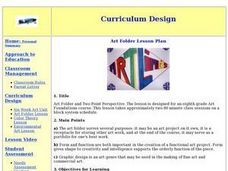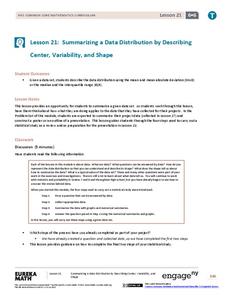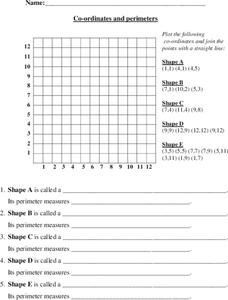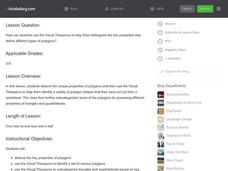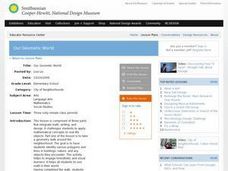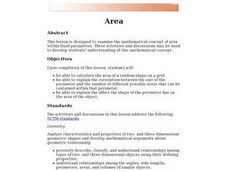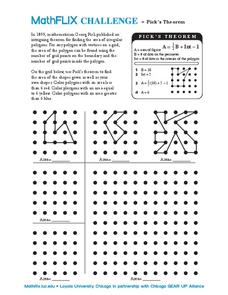Curated OER
Polygon Shapes
In this polygon worksheet, students study the various shapes and then name each of the two-dimensional shapes. Students write the shape names on the provided lines.
Curated OER
Arts Impact and Math
Third graders incorporate math into dancing. In this algebra lesson, 3rd graders identify different shapes and patterns using dance movements. They relate the different creations to polygons as they incorporate the use of stretchy bands...
Curated OER
Perimeter All Around
Young scholars explore perimeter and area of regular and irregular polygons. They experiment with color squares and create different arrangements using the same number squares. Then they compare the area and perimeter measurements of each.
Curated OER
Art Folder and Two Point Perspective
Eighth graders examine how to create a 3-D effect on a flat surface and draw in two-point perspective. They view and discuss elements of design, analyze artwork by M.C. Escher and Roy Lichtenstein, and design and create an art folder.
Curated OER
2D Shapes (1)
In this shape recognition worksheet, students study each of the shapes and then write the names of the two-dimensional polygons on the lines.
Curated OER
Living in a Geometrical World
Students participate in a series of hand-on, online, and multimedia activities to examine 2 dimensional and 3 dimensional shapes. They describe common geometric solids. They construct rectangular prisms using straws and ribbon.
Technical Sketching
Introduction — Surfaces and Edges
How different can 3-D and 2-D really be? An engineering resource provides an explanation about the importance of two-dimensional technical drawings. Several samples show how to create multi-view drawings from pictorials and...
EngageNY
Summarizing a Data Distribution by Describing Center, Variability, and Shape
Put those numbers to work by completing a statistical study! Pupils finish the last two steps in a statistical study by summarizing data with displays and numerical summaries. Individuals use the summaries to answer the statistical...
Inside Mathematics
Two Solutions
Many problems in life have more than one possible solution, and the same is true for advanced mathematics. Scholars solve seven problems that all have at least two solutions. Then three higher-level thinking questions challenge them to...
EngageNY
Analyzing Residuals (Part 2)
Learn about patterns in residual plots with an informative math activity. Two examples make connections between the appearance of a residual plot and whether a linear model is the best model apparent. The problem set and exit ticket...
Curated OER
Recognize Triangles
In this shapes worksheet, learners are asked to "colour" all of the triangles they find on the page. There are 10 shapes on the page and 4 are triangles. The second page contains suggestions for teachers on activities with 2-D shapes.
Curated OER
Shape Matching Worksheet - Black and White
In this geometry instructional activity, students draw a line from each geometric shape shown on the left to the matching shape on the right side of the page. They work with plane figures such as a triangle, an oval, a rectangle, and a...
Curated OER
Shape Identification Worksheet
In this shape identification worksheet, students mark the correct answer to each of 4 multiple choice questions while working on-line. They choose from 4 choices as they identify a square, triangle, circle, and rectangle. They print the...
Curated OER
Exploring and Classifying Polygons
Not particularly coloful, but definitely informative, here is an introductory presentation on polygons. The basic shapes are covered, from triangles to decagons. Special polygons like the trapezoid and the rhombus are also covered. Not...
Curated OER
Geometric Shapes: Review of 2D and 3D Figures
In this geometric shapes worksheet, students identify 4 drawings as polygons or not, 1 drawing as regular or not and then write the name of 3 solid figures.
Curated OER
Coordinates and Perimeters
Here is a lesson containing a great activity based on coordinates, and the perimeters of shapes created using a given set of coordinates. After youngsters creat a shape on a grid based on some coordinate pairs, they must identify which...
Curated OER
Small and Large Squares
Young mathematicians classify squares according to attributes. They sort squares according to specific attributes. Students explore squares in repeating patterns and order squares according to size. Engaging extension activities are...
Curated OER
Know Your Polygons!
Students identify and categorize different polygons. In this polygons lesson plan, students research and identify properties of polygons, identify different polygon shapes, and categorize different triangles and quadrilaterals.
Curated OER
Our Geometic World
Young scholars walk around the neighborhood and identify various polygons and lines in buildings, nature and other objects. They design a building using various geometric patterns, shapes and lines. Students complete a descriptive...
Curated OER
Finding the Area and Perimeter of Polygons
Seventh graders practice finding the area and perimeter of polygons. In this polygon area lesson, 7th graders brainstorm shapes and take a walk to locate shapes. Students record properties of shapes and use various shapes to make a...
Curated OER
Area Applet
Elementary math classes calculate the area of a shape and explain the correlation between the size of the perimeter and the areas that can be contained within that perimeter. They also explain the effect the shape of the perimeter has on...
Curated OER
Pick's Theorem
In this Pick's Theorem worksheet, students solve and graph 6 different problems that include using Pick's Theorem to solve. First, they use Pick's Theorem to determine the area of the shapes given as well as their own shapes drawn. Then,...
Curated OER
Property Lists for Quadrilaterals
Students establish classifications of shapes by various properties (angles, sides, etc.). They introduce the important properties of common shapes. Students develop an awareness of the wide variety of ways the 2-D shapes can be alike.
Curated OER
Pop-it...Stop-it
Students observe how certain geometric shapes can be used to make some structures rigid and others flexible. The activity involves construction of a 30-60 right triangle, folding while following directions, and identifying polygons.
Other popular searches
- 3 D and 2 D Shapes
- Sorting 2 D Shapes
- Geometric 2 D Shapes
- Classifying 2 D Shapes
- 2 D Shapes and Attributes
- Area of 2 D Shapes
- Transform 2 D Shapes
- Maths 2 D Shapes
- Classifying 2 D Shapes
- 2 D Shapes and Patterns
- Drawing 2 D Shapes
- Area/perimeter 2 D Shapes



